The silent plastic crisis in rural Bangladesh
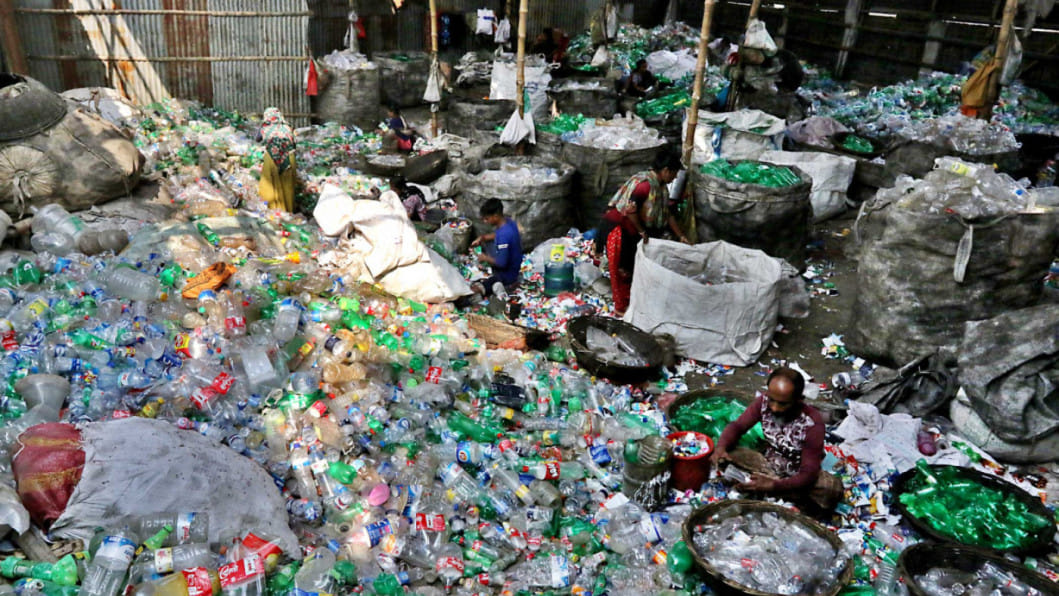
Sumon runs a small tea stall. Every morning, he wades through ankle-deep plastic waste—a growing pile of discarded bottles, wrappers, and bags that clog the drains around his shop. "When it rains, the market floods because the drains are blocked with plastic," he says. "Business drops, and so does our hope for a cleaner place."
While cities like Dhaka and Chattogram often dominate discussions on plastic pollution, the rural and peri-urban areas of Bangladesh bear a silent but severe brunt. In rural Bangladesh, plastic waste infiltrates rivers, irrigation channels, and croplands, disrupting daily life and livelihoods. Yet, this reality rarely garners attention.
It is believed that Bangladesh produces approximately 87,000 tonnes of single-use plastic waste each year, and nearly 22 percent of this originates from rural areas. There is a notable lack of awareness regarding the environmental and health risks associated with plastic waste in rural areas. For instance, only 5.5 percent of rural consumers are aware of the health risks posed by single-use plastics, compared to 18.4 percent in urban areas. These facts highlight that plastic pollution is not solely an urban issue.
Of the plastic waste generated in Bangladesh, only 36 percent is recycled, leaving the rest to accumulate in open dumps, water bodies, and agricultural lands, exacerbating waterlogging and soil degradation. In rural areas, plastic waste mixed with crop residues blocks irrigation channels, starving crops of vital water flow. Additionally, plastic debris gathers around sluice gates, worsening persistent waterlogging.
For local farmers and traders, these seemingly small disruptions add up, impacting both their income and the local ecosystem. The impacts are further compounded by the surge in single-use plastics. Despite a ban on plastic bags in 2002, single-use plastic consumption has increased by 200 percent over the last decade, with rural areas increasingly bearing the consequences.
The government's National 3R Strategy was a step towards tackling the plastic menace through reducing, reusing, and recycling waste. However, its implementation at the grassroots level remains largely on paper. Local government institutions, particularly union parishads and municipalities, are supposed to lead the charge in managing plastic waste. But resource constraints, limited technical capacity, and a lack of structured waste management plans hinder their effectiveness.
Despite these challenges, small-scale initiatives in Bangladesh are emerging as potential game changers. The informal sector collects around 1,000 tonnes of plastic waste daily, significantly contributing to recycling efforts. However, the lack of formal recognition and support limits their impact. We are seeing the private sector also stepping into this domain. In Dhaka, for instance, Standard Chartered Bank launched a plastic exchange programme, allowing community members to trade plastic waste for cash or essentials. Replicating this initiative in rural areas could motivate grassroots communities to engage in waste collection while creating local income opportunities. Encouragingly, a number of development platforms are working with the private sector. They are collaborating to establish and institutionalise market-centric collection hubs for plastic waste, incentivising traders to segregate and deposit waste for recycling. Such initiatives show how grassroots engagement can foster a culture of environmental responsibility, even in areas with limited waste management infrastructure.
But to effectively tackle the long-standing plastic pollution situation in rural and peri-urban areas, a few good examples are not enough; we need collective efforts and mutually benefitting strategies. First, local governments need targeted support to incorporate plastic waste management into local development plans. Waste segregation at the source, coupled with community-based recycling hubs, can lay the groundwork for more structured waste management systems.
Second, engaging local entrepreneurs in waste recycling can transform plastic from a pollutant into a resource. With technical training and seed funding, they could establish small recycling units that create useful products like eco-bricks or compost bins. In Indonesia, fishing villages have turned to innovative solutions like eco-bricks—plastic bottles filled with non-biodegradable waste used as building materials to manage plastic waste effectively. These initiatives highlight the potential of local actions in combating plastic pollution.
Third, educational programmes in schools and community centres can instil sustainable habits from an early age, reinforcing the principles of Reduce, Reuse, and Recycle. In Cox's Bazar, school collection systems have already been set up to teach children about waste segregation and composting, showing how early intervention can cultivate lasting environmental responsibility. Covering two climate hotspots—Naogaon and Satkhira—the WaterAid–Swisscontact consortium has engaged school-level students in clean-up campaigns, waste segregation activities, and educational programmes to instil sustainable waste practices.
Lastly, public-private partnerships must be leveraged to provide the necessary infrastructure and incentives for waste management. One example is Practical Action's initiative in Faridpur, where a circular economy approach is employed to transform previously unprofitable waste into valuable commodities. In this initiative, low-grade plastics collected from the Padma River and local communities are processed using pyrolysis technology, converting them into high-grade oil and black carbon, thus creating employment opportunities and improving waste workers' livelihoods.
We must keep in mind that the fight against plastic pollution extends far beyond urban centres. The crowded markets of a remote union in the south and the irrigation fields of the north are not just bearing the brunt of plastic pollution; they are also fertile grounds for solutions. With the right support, rural communities can transform from passive victims to active change-makers, driving localised recycling initiatives, championing waste reduction, and adopting sustainable practices.
Saief Manzoor-Al-Islam and Sabbir Rahman Khan are development practitioners.
Views expressed in this article are the author's own.
Follow The Daily Star Opinion on Facebook for the latest opinions, commentaries and analyses by experts and professionals. To contribute your article or letter to The Daily Star Opinion, see our guidelines for submission.

 For all latest news, follow The Daily Star's Google News channel.
For all latest news, follow The Daily Star's Google News channel. 



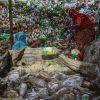
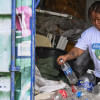

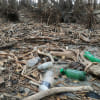
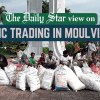


Comments